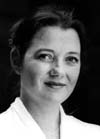Is Behavior Determined, or are we Free?One powerful reason for holding to mind-body, or body-soul, dualism in the modern period is that the major perceived alternative has been a reductive physicalist account, which seems to imply determinism. Therefore, it is important in theological discussions to distinguish between reductive and nonreductive versions of physicalism. To see the difference, consider a recent finding by V.S. Ramachandran at the University of California, San Diego. Ramachandran and his research team studied patients suffering from temporal lobe epilepsy. It has long been known that such patients often experience intense mystical and religious experiences. This recent study involved testing patients' involuntary responses to a series of test words about sex, violence, and religion. This was done by measuring the electrical conductivity of their skin, a standard measure of emotional response. The result was that the test group showed a stronger response to the religious language than did a group of "normally" religious people and a neutral control group. This led to speculation that the temporal lobe is part of the neural machinery involved in religious experience. Now, what further conclusions are to be drawn from such claims?
One commentator says "there is the quandary whether the [brain]
created God or whether God created the [brain]." Just as it is possible to distinguish between visual perception and visual imagination, similarly it is possible to make a distinction between authentic religious experience and experiences that are merely psychological and/or neurological phenomena. Religious believers have established communal procedures for "testing" religious experience for authenticity. These tests include consistency with Scripture or earlier teaching, and whether the experience fits into the life story of the individual and the community. For example, does it lead to an increase in the "fruits of the Spirit," such as love, joy, and peace? The issue of reduction versus nonreduction can be stated this way. Is it possible to identify mental states with brain states, while avoiding the implication that mental life is totally determined by physical laws? If such determinism cannot be avoided, then human freedom is an illusion. As such, we are deceived about the aspects of our humanity we hold most dear; religious faith, love, morality, and intellectual endeavors are merely the outworking of blind laws of physics. The reductionist says these experiences are nothing but brain states. The nonreductive physicalist says, instead, that the brain (or the brain in the body and in social relations) is the means which make these experiences of God and other humans possible for a physical creature.
Email link | Printer-friendly | Feedback | Contributed by: Dr. Nancey Murphy |






